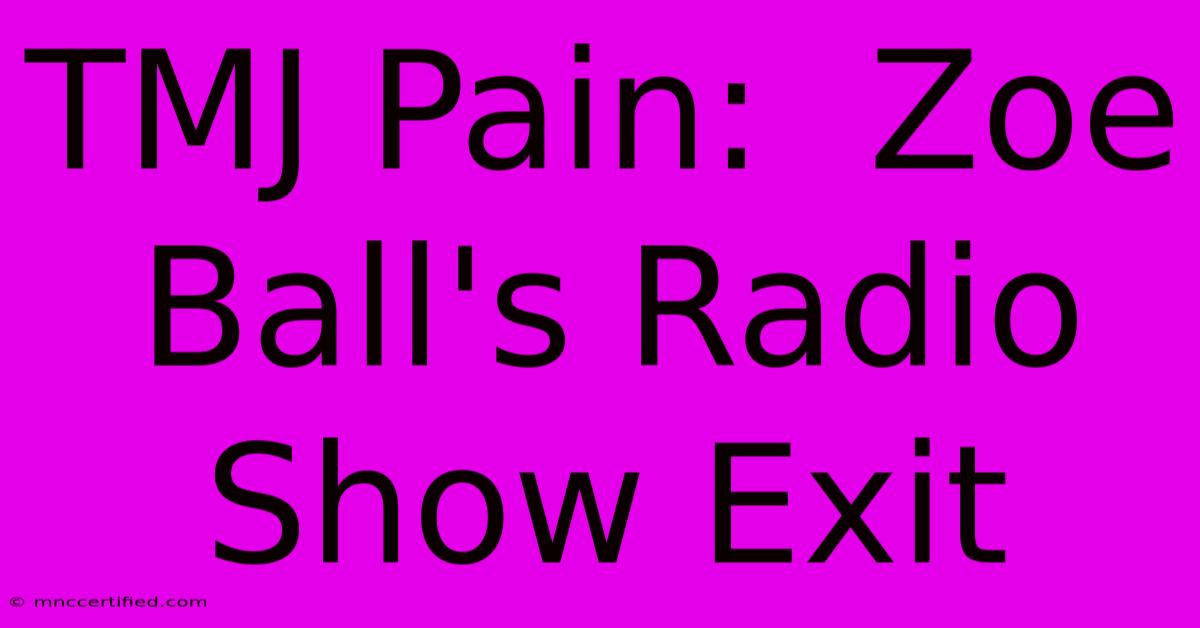TMJ Pain: Zoe Ball's Radio Show Exit

Table of Contents
TMJ Pain: Zoe Ball's Radio Show Exit and the Spotlight on a Silent Sufferer
Zoe Ball's recent departure from her BBC Radio 2 breakfast show sent shockwaves through the broadcasting world. While the official reason cited was a desire for a change of pace, speculation quickly arose, with many pointing to the debilitating effects of TMJ pain (Temporomandibular Joint disorder) as a contributing factor. This unexpected exit brought the often-overlooked condition into the public eye, highlighting the significant impact it can have on daily life.
Understanding TMJ Disorder and its Symptoms
TMJ, or temporomandibular joint disorder, affects the jaw joint and the muscles controlling jaw movement. The symptoms can vary drastically from person to person, but commonly include:
- Jaw pain: This can range from mild discomfort to severe, throbbing pain.
- Headaches: TMJ often manifests as tension headaches, migraines, or even facial pain.
- Earaches: Many sufferers experience earaches, tinnitus (ringing in the ears), or a feeling of fullness in the ear.
- Neck and shoulder pain: The muscles in the neck and shoulders are often tense and painful due to the strain of compensating for jaw problems.
- Clicking or popping in the jaw: This is a common sign of TMJ, indicating joint dysfunction.
- Difficulty chewing or opening the mouth wide: This limitation can significantly impact daily activities.
- Facial pain: Pain can be felt in the face, particularly around the jaw and temples.
While the exact causes of TMJ are not fully understood, contributing factors include stress, grinding teeth (bruxism), arthritis, jaw injuries, and even poor posture.
Zoe Ball's Case and the Impact of TMJ on Professional Life
Although Zoe Ball hasn't explicitly confirmed TMJ as the reason behind her radio show departure, the timing and the nature of her reported symptoms align with the debilitating effects of the condition. The demands of a high-pressure job like presenting a breakfast radio show, requiring prolonged speaking, concentration, and potentially stressful interactions, can significantly exacerbate TMJ symptoms. The constant strain on the jaw muscles can lead to intense pain, fatigue, and difficulty performing the job effectively.
The pressure associated with such a high-profile role could also intensify the symptoms due to the stress-TMJ connection. This serves as a potent reminder of the unseen struggles many individuals face while maintaining a demanding career.
Seeking Help for TMJ Pain
If you're experiencing any of the symptoms mentioned above, it's crucial to seek professional help. Early diagnosis and treatment are essential to prevent the condition from worsening. A dentist, oral surgeon, or physical therapist specializing in TMJ can provide a proper diagnosis and recommend appropriate treatment options. These may include:
- Pain management: Over-the-counter pain relievers, muscle relaxants, or stronger prescription medications.
- Physical therapy: Exercises and stretches to improve jaw mobility and reduce muscle tension.
- Splints or mouthguards: To prevent teeth grinding and protect the jaw joint.
- Lifestyle changes: Stress management techniques, dietary modifications, and improved posture.
- Surgery: In severe cases, surgery may be necessary to correct jaw misalignment or other structural issues.
The Importance of Raising Awareness
Zoe Ball's situation sheds light on the hidden struggles many people endure due to TMJ pain. Raising awareness of this condition is vital to encourage early intervention and support for those affected. By openly discussing TMJ, we can help reduce the stigma surrounding the condition and empower individuals to seek the help they need to manage their symptoms and improve their quality of life. Open conversations like this are crucial in destigmatizing conditions that affect millions but are often discussed in hushed tones.
Keywords: TMJ, Temporomandibular Joint Disorder, Zoe Ball, Radio 2, Jaw Pain, Headache, Earache, Stress, Bruxism, Treatment, Diagnosis, Jaw Pain Relief, TMJ symptoms, TMJ Awareness
This article is optimized for search engines by incorporating relevant keywords naturally throughout the text. It uses a clear structure with headings and subheadings to improve readability and engagement. Further SEO would involve promoting this article through social media, guest blogging, and link building.

Thank you for visiting our website wich cover about TMJ Pain: Zoe Ball's Radio Show Exit. We hope the information provided has been useful to you. Feel free to contact us if you have any questions or need further assistance. See you next time and dont miss to bookmark.
Featured Posts
-
Police Officer Life Insurance
Nov 29, 2024
-
Goff Giants And Russinis Report
Nov 29, 2024
-
Watch Nfl For 99p Dazn Black Friday
Nov 29, 2024
-
Nbcs Thanksgiving Day Madden Special
Nov 29, 2024
-
Black Diamond Insurance Group
Nov 29, 2024